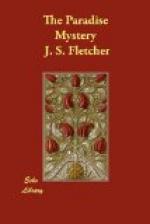“Oh?” said Bryce. “And what?”
“Mrs. Deramore, who lives, as you know, next to Dr. Ransford,” replied Mrs. Folliot, “told me this morning that on the morning of the accident, happening to look out of one of her upper windows, she saw a man whom, from the description given in the newspapers, was, Mrs. Deramore feels assured, was the mysterious stranger, crossing the Close towards the Cathedral in, Mrs. Deramore is positive, a dead straight line from Dr. Ransford’s garden—as if he had been there. Dr. Bryce!—a direct question should have been asked of Dr. Ransford—had he ever seen that man before?”
“Ah, but you see, Mrs. Folliot, the Coroner didn’t know what Mrs. Deramore saw, so he couldn’t ask such a question, nor could any one else,” remarked Bryce, who was wondering how long Mrs. Deramore remained at her upper window and if she saw him follow Braden. “But there are circumstances, no doubt, which ought to be inquired into. And it’s certainly very curious that Dr. Ransford should send a wreath to the grave of—a stranger.”
He went away convinced that Mrs. Folliot’s inquisitiveness had been aroused, and that her tongue would not be idle: Mrs. Folliot, left to herself, had the gift of creating an atmosphere, and if she once got it into her head that there was some mysterious connection between Dr. Ransford and the dead man, she would never rest until she had spread her suspicions. But as for Bryce himself, he wanted more than suspicions—he wanted facts, particulars, data. And once more he began to go over the sum of evidence which had accrued.
The question of the scrap of paper found in Braden’s purse, and of the exact whereabouts of Richard Jenkins’s grave in Paradise, he left for the time being. What was now interesting him chiefly was the advertisement in the Times to which the bank-manager from London had drawn attention. He had made haste to buy a copy of the Times and to cut out the advertisement. There it was—old friend Marco was wanted by (presumably old friend) Sticker, and whoever Sticker might be he could certainly be found under care of J. Braden. It had never been in doubt a moment, in Bryce’s mind, that Sticker was J. Braden himself. Who, now, was Marco? Who—a million to one on it!—but Ransford, whose Christian name was Mark?
He reckoned up his chances of getting at the truth of the affair anew that night. As things were, it seemed unlikely that any relations of Braden would now turn up. The Wrychester Paradise case, as the reporters had aptly named it, had figured largely in the newspapers, London and provincial; it could scarcely have had more publicity—yet no one, save this bank-manager, had come forward. If there had been any one to come forward the bank-manager’s evidence would surely have proved an incentive to speed—for there was a sum of ten thousand pounds awaiting John Braden’s next-of-kin. In Bryce’s opinion the chance of putting in a claim to ten thousand pounds is not left waiting forty-eight hours—whoever saw such a chance would make instant use of telegraph or telephone. But no message from anybody professing relationship with the dead man had so far reached the Wrychester police.




